NPC Reino Unido
NPC fue fundada por un grupo de amigos que compartían el interés y la pasión por los primates y la conservación. El Reino Unido sigue siendo la oficina central de la familia NPC.
¡Conoce nuestro trabajo en Reino Unido aquí!
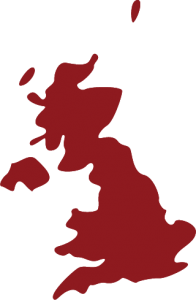
NPC Reino Unido Proyectos
Protege, educa, facilita, investiga, reforesta y rescata
Eventos
Leyes
Recaudación de fondos
Conoce al equipo

Brooke Aldrich
NPC UK
Brooke lleva muchos años estudiando y trabajando con primates y en favor de ellos. Ha sido administradora y directora de NPC desde
que obtuvo el estatus de organización benéfica en 2007. Brooke se licenció en Conservación de Primates en la Universidad Oxford Brookes, donde realizó su tesis doctoral en el noreste de Perú. Tras cursar un segundo máster en Bienestar Animal Internacional, Ética y Derecho en la Universidad de Edimburgo, Brooke está especialmente interesada en la interacción entre el uso de primates como «artistas», el comercio legal e ilegal de primates y los esfuerzos de conservación en la naturaleza. También trabaja para la Asia for Animals Coalition, coordinando su Coalición de Macacos, y la Animals Asia Foundation. Brooke es miembro de la Sección de Interacciones entre Humanos y Primates del Grupo de Especialistas en Primates de la CSE de la UICN.
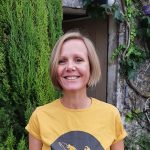
Katie Chabriere
NPC UK
Katie es lingüista y traductora titulada, y ha enseñado durante algún tiempo en Tailandia, donde trabajó como voluntaria en el Proyecto
de Rehabilitación de Gibones. Después de hacer prácticas y trabajar en el Santuario de Monos de Wild Futures en el equipo de bienestar de primates y como responsable de educación, Katie ayudó a fundar Moroccan Primate Conservation UK. Lo más destacado de su tiempo con NPC hasta ahora ha sido visitar Perú para ayudar a dirigir un programa educativo en la cuenca del Amazonas. Ahora vive en Francia, donde es músico y da clases de inglés para niños utilizando el arte y el entorno natural. También es diplomada en conservación, bienestar y comportamiento de primates.
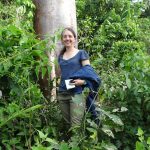
Rachel Henson
NPC UK
Rachel es licenciada en Biología y ha trabajado en un centro de rescate de primates en el Reino Unido, así como en santuarios de Indonesia y
Perú.
Pasó un año en el centro de campo Danau Girang, en Malasia, donde guió a investigadores visitantes en paseos nocturnos y estudios fluviales, creó y editó el boletín del centro y llevó a cabo un proyecto de investigación con el Proyecto de Conservación del Orangután de Kinabatangan. Tiene un máster en Escritura de Viajes y Naturaleza y ahora compagina la escritura independiente con su trabajo diario cuidando primates ex comerciantes y de laboratorio. Rachel se unió al equipo de NPC en 2017.

Kristina Stazaker NPC UK
Kristina Stazaker es licenciada en Biología y Conservación de la Fauna silvestre, especializada en el comercio de accesorios
fotográficos de primates. Su tesis se publicó en más de 20 revistas y periódicos de todo el mundo. Tras trabajar como cuidadora de primates y colaborar con santuarios de primates, ahora dirige su propio negocio de asesoramiento a organizaciones benéficas sobre su sostenibilidad financiera. Kristina se unió a NPC como Tesorera en 2024.

Joy Roberts-Chapple
NPC UK
Mientras estudiaba su licenciatura (con honores) en Comportamiento Animal, Joy se involucró en el
trabajo de Wild Futures’, The Monkey Sanctuary, un santuario de primates. Allí descubrió su pasión por los primates. Tras trabajar como voluntaria en The Monkey Sanctuary, Joy estudió un máster en Conservación de Primates en la Universidad Oxford Brookes. Para su tesis final estudió la personalidad de los gibones de manos blancas (Hylobates lar) en un centro de rescate de Tailandia. Joy es la fundadora de la plataforma educativa en línea «Primate Wonder», con la que espera educar y entusiasmar a la gente sobre los primates y su conservación, y animarla a participar en la conservación en la medida de sus posibilidades.

Lauren Arnaud James
Lauren se unió a NPC como administradora en 2024. Con un máster en primatología por la Universidad Oxford Brookes y un máster
previo en Estudios Internacionales, Cultura, Conflictos y Paz, Lauren ha tenido un interés particular en la conservación de la fauna silvestre, el bienestar animal, el comercio de fauna silvestre y las interacciones entre humanos y animales. Tras haber trabajado en centros de rescate de primates en la India y el Reino Unido, Lauren trabajó durante algún tiempo para la Coalición contra la Crueldad Animal en los Medios Sociales (SMACC) de AfA, centrándose especialmente en el contenido sobre primates en los medios sociales, desde la tenencia de mascotas hasta las formas extremas de maltrato. Lauren trabaja ahora para Asia for Animals Coalition (AfA) y está encantada de poder dedicar parte de su tiempo libre a ayudar a NPC en su misión de ayudar a los primates de Sudamérica.
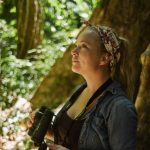
Magdalena Svensson
Magdalena tiene formación en conservación de la vida salvaje y en los últimos 17 años se ha centrado en la conservación de
primates. Está especializada en ecología y conservación de primates nocturnos (África y Neotrópico), vocalización de primates, turismo de primates y comercio de fauna silvestre. Magdalena ha trabajado como técnico de laboratorio y profesora asociada en el Máster y Doctorado en Conservación de Primates de la Universidad Oxford Brookes durante los últimos 14 años y desde 2023 es también oficial de conservación en el Jardín Botánico de Conservación Internacional, trabajando en evaluaciones globales de la Lista Roja de árboles. Es miembro investigador activo del Nocturnal Primate Research Group y del Oxford Wildlife Trade Research Group y miembro del Grupo de Especialistas en Primates de la CSE de la UICN y del Grupo de Especialistas en Árboles Globales de la CSE de la UICN. Magdalena se unió a NPC como administradoa en 2024.
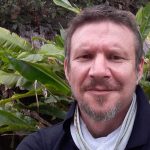
Mika Peck
NPC UK
Mika es biólogo de la conservación y trabaja en la Universidad de Sussex (Reino Unido). Su investigación se centra en proyectos de
conservación y medios de vida sostenibles en Sudamérica y Papúa Nueva Guinea. Una de las principales áreas de trabajo del Dr. Mika ha sido la aplicación del enfoque «parabiólogo». Este enfoque ofrece formación a nivel de base para identificar vías de desarrollo que optimicen los medios de vida sostenibles locales y los objetivos de conservación.
